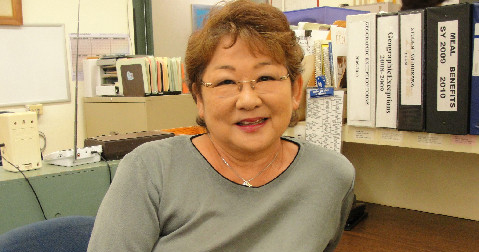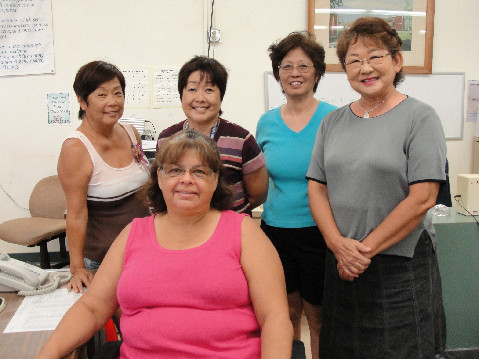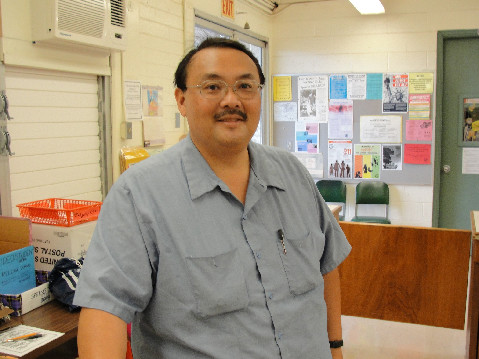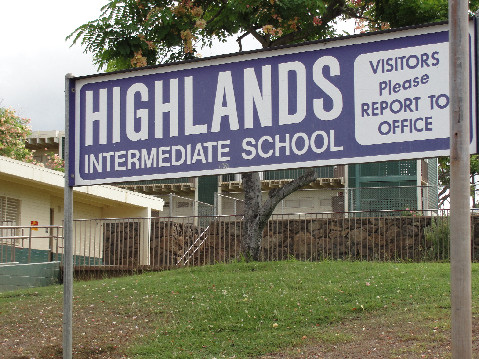
Highlands Intermediate School in Pearl City graduates students each year thoroughly prepared to enter High School in the fall. Principal Amy Martinson makes sure of that with a passion to deliver an education experience that prepares her students to excel.
Highlands Intermediate School is highly recognized globally through competition in the areas of math, science as well as the success of the schools Robotics team.
Martinson is first to recognize a staff and a core of volunteers that go beyond the call to make that happen. While at the school office to conduct the following interview, I was introduced to Highlands Intermediate School Food Services Manager, Darryl Nakagawa who is the 2008 DOE Employee of the Year. Also in the office was Kathy Lin who is nominated for this year’s DOE Employee of the Year. I have to say that I was impressed from the very beginning.
As a former student at Highlands Intermediate back in the early 70’s I couldn’t help but reminisce about my days at the school. Everything seemed the same, the buildings, the smell of the trees, the basketball court. But you know, I can’t seem to remember the Principal at the time. I bet when this generation of student’s moves on from Highlands they will remember Principal Martinson and the very special teachers, staff and volunteers that made a difference in their 7th and 8th grade education experience.

Highlands Intermediate School office staff with Principal Martinson
Q: What makes Highlands Intermediate School so successful that year after year it ranks as one the top education institutions in the State?
A: “We’re a science, technology, engineering and math school. “A S.T.E.M. school.” Our math team has gone on to State’s and Nationals as well, so you know we are a very competitive in math.”

Darryl Nakagawa, 2008 DOE Employee of the Year
Q: What is your experience as an educator and administrator?
A: “Well, I’ve been in the DOE over 25 years. My tenure as a teacher moved me up to Vice Principal. I was Vice Principal for 8 years. I’ve been Principal for 12 years.”
Q: You mentioned Highlands Intermediate as a S.T.E.M. school. What type of programs do you offer the students in the S.T.E.M. system?
A: “We started 3D CAD – Computer Assisted Design last year. That’s going to follow through up in the high school. We do Microscopy in the 7-8 grade science and they will continue with Microscopy at Pearl City High School as well.”

Highlands Intermediate School
Q: I understand you also have a highly successful Robotics program?
A: “We are part of Lawrence University’s Robofest. The Founder is at Lawrence University and he has to sanction how we conduct our Robofest competition. Every year we come out with things that are at least “green”, something to do that saves the earth.
We participate in VEX competition which is similar to FIRST for the high school. We also participate in Botball and First Lego League. We are the host school or sponsor of Robofest for the entire state.”
Q: Has Highlands Intermediate actually won in competition?
A: “We have won to represent Hawaii at the Botball, VEX competitions and also the National Science Olympiad all over the United States. These are World or National competitions.
Q: What are the plans to continue the high level of competitive teams with the current economy affecting school programs?
A: “That will not stop because we are seeking grants to help with our competitions. For instance, the Pearl City Association is helping us to buy new NXT Robotic kits so that, you know, they are getting old with so much use by the students that we need more.”
Q: So the Pearl City Association is funding the Robotics program?
A: “Well, I put in an application for $1500 dollars for NXT kits.”
Q: Anyone you would like to recognize that assists in making your programs successful?
A: “Sure, I’ll tell you what is, besides the students who are very motivated; it’s the coaches and advisors. I have two excellent Robotics coaches and one advisor. Dwayne Abuel who is our tech coordinator, Joan Aokai who has won National Botball competitions and Kathy Lin who has won many international science fair competitions as well as FIRST Lego League competitions.
It’s not to say that these three people are the only people that assist in the programs. It takes a whole school to participate. My science department assists with these teachers. My math department assists these teachers.”
Q: The school stresses leadership skills and service to the community. How is that accomplished?
A: “First of all, I try to mentor that leadership and all those kinds of skills. So what I do is I delegate a lot of the responsibilities of running the school to my teachers. I try to develop teacher leaders and volunteers who like to take an idea and run with it.”
Q: How does it filter down to the students?
A: “For the students we want to close the globalization gap. That’s what we want to do. We want to teach our students collaboration skills, the questioning skills, the leadership skills that they are going to need in competition for jobs.”
Q: How receptive are the students?
A: “What we try to do as a school is to engrain in the students that “you are going to college” because you’ll need college. We are trying to develop a college going culture at Highlands.
This college going culture means you gotta know what the 21sst Century demands out there are and then you have to study these things. We’re trying to teach them all of the skills necessary to not only survive in the 21st Century but to do well in the 21sst Century.”
Q: How well do you see Military dependents making the transition from being educated on the mainland or other parts of the world to Highlands Intermediate School?
A: “I have about 10% military students in my school. I’m so glad that the Manana housing was revamped and rebuilt. Now there is opportunity for families to move in to great conditions. I get a lot of military students in the Navy from Lehua. When they come here they know they are just like any other student. We give them a great transition. We give the parents so much information that I think their apprehensions and fears are eased because of the information. We will have a military transition center in our school, it’s going to be built, and the design is in there. That’s to make sure that all of the parents including the military parents know a lot about Highlands and that they are safe here.”
Q: If you could, what would you change in the educational system today to better the learning experience for all students?
A: “I would like to fashion the schools to be longer days, less days off for kids. We’re not an agricultural society anymore. We need to get away from that. I know it’s hot in the summer but you know I would like longer school days like Japan and China. They go from maybe 8am to 4:30pm and the school year is longer. The teachers follow the students throughout their K-12 experience.
I think if that occurred, we would have more results. I’m not saying all work and no play. Play is important too, the social aspects.”
Q: What wouldn’t you change?
A: “If it’s my school, I would never change my staff. My staff is a winning combination for kids. They are for the kids. That’s our motto for this year, “For the Kids”. They work long hours. They go on all these extracurricular kinds of activities like competitions. They work on the weekends. They provide the time for students to come in on the weekends to work on projects.
If there is one thing that I wouldn’t change about my school is my staff.”
Q: If you could sit with President Obama and enter into a conversation about the current state of Hawaii’s educational system, what would you like to discuss?
A: “I have always dreamt of sitting with the President. I’d like to discuss with him if we could break up our one system DOE in Hawaii and be more like other states where it’s more district controlled because the needs of our districts are all different. I’m sure that Hawaii District and Leeward Districts are two different animals. I don’t know if we can continue to run it under one system. Our needs are much more localized.
I want to show him that the teachers in Hawaii are so dedicated.”